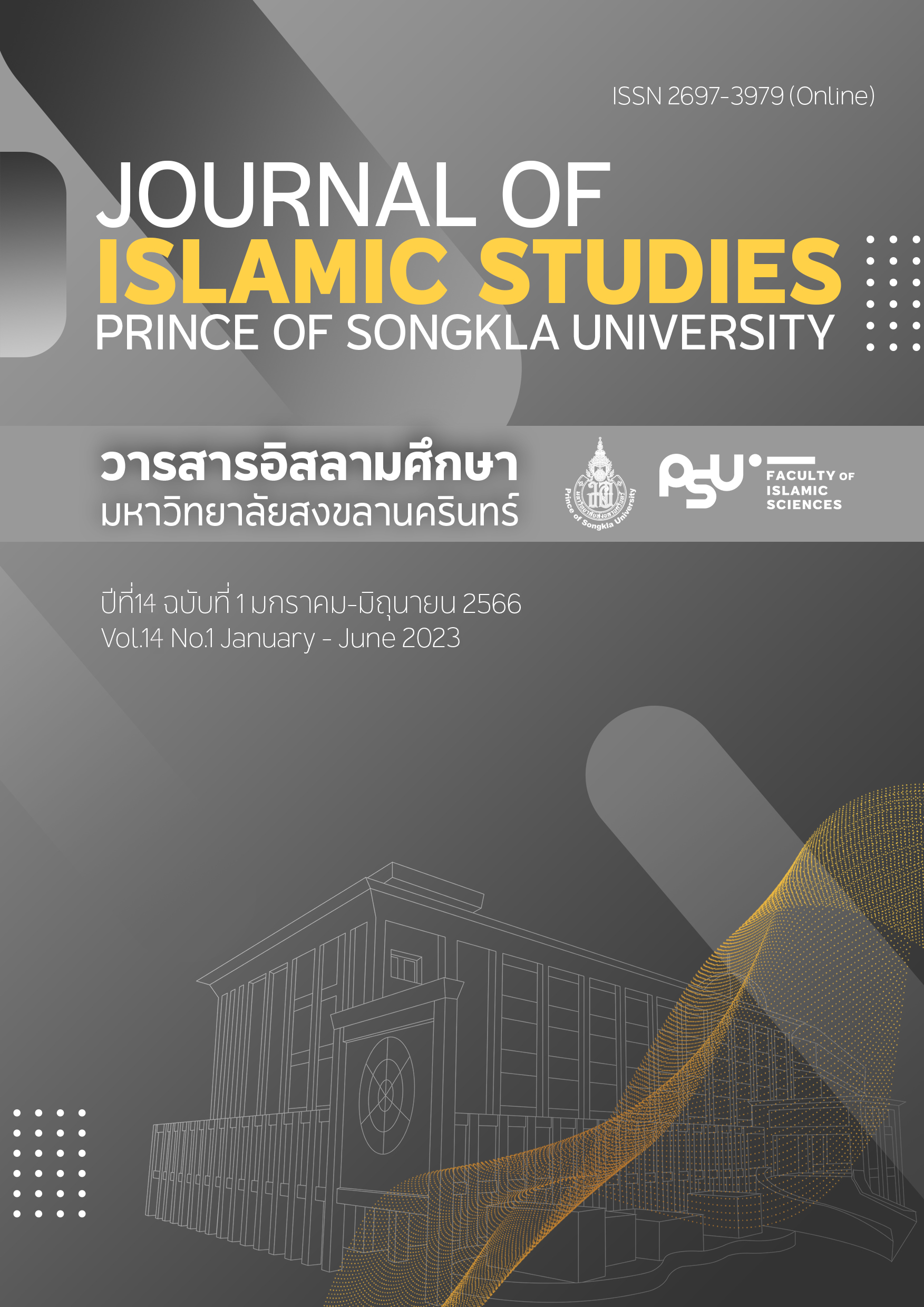The role of widowed Muslim women in the three southern border provinces in adapting to Islamic ways: a case study : Widowed Muslim women in Bannang Sata District, Yala Province
Keywords:
Adaptation, Widowed muslim women, Islamic way, Bannang Seta District, Three Southern Border ProvincesAbstract
Objectives: 1) to study the knowledge and social status of Muslim widowed according to Islamic principles ; 2) to study the problems faced by Muslim widowed in Social and Cultural to support Muslim widowed in Bannang Sata District, Yala Provinc
Methodology: A qualitative research which encompass documentation and field study. the sampling were 24 Muslim widowed and 6 religious leaders in Bannang Sata District, Yala Province, using a purposive method. The research instrument using in - dept interview and participated observation.
Research Findings: 1) the widowed whose husbands died or who have been divorced did not have sexual intercourse and iddah have the right to receive half of the dowry or as agreed between them. The widowed who is husband dies while pregnant, iddah is childbirth. And widowed whose divorced in her period and iddah is third times cleanliness ( Addhur). While, she is in menopause, iddah is three months. As for the wives whose husband died and are not pregnant. Iddah is four months and ten days which is entitled to 1/4 of her husband’s inheritance if they have no children, and 1/8 if they have children. 2) The problem faced by by the widowed is poverty and parenting problem. In addition to the wife of state officer who died in the unrest. As for other types of widowed there is no assistance from both the private and government. have adapted to the islamic way of life at different levels according to their faith and orphans will be helped by mosque and faithful occasion. The observation indicated that most of them are living a difficult life.
Contribution: 1) Husband should be patient and stay away from divorce unless there is no alternative. If necessary, islamic principles should be apply as a norm. 2) Widowed woman test with restrained in caring for children and should pray especially at night and be patient in adjusting according to the Islamic way, therefore that Allah will open a way out easily.
References
Abu Dawood, S. S. (2000). Sunan Abi Dawood. Dar Ibn Haram.
Arab Universities Alumni Association. (1999). Holy Quran Thai meaning: King Fahd Glorious Quran Printing Complex. Madinah al-Munawarah.
Al Bani, W. S. (1975). Al mar’ah Al muslimah. Dar Ibn Haram
Al Bukhari, M. I. (2008). Sahih al Bukhari. Markaz Maktabat al-Fa lil Attijarat wa al-Tawzy‘i.
Al-Qurtubi, R. (1981). Bidayah al-Mujtahid wa al- Nihayah almuqtasid (5th Ed.). Dar al- Ma‘rifah.
Al khauli, B. (nd). Al Islam Wal Mar’ah Al Muasorah (3 th Ed.). Dar al Qalam.
Al- Khusti, M. (1994). Petua Kebahagian Rumahtagga. Darul Nu’man.
Buatchum, K., Kongsuwan, V., & Suttharangsee, W. (2017). Psychological Self-Care of Widows from the Unrest Situation in Southern Thailand: A Preliminary Study. Journal of Research in Nursing-Midwifery and Health Sciences, 37(1), 97–104. Retrieved from https://he02.tci-thaijo.org/index.php/nur-psu/article/view/ 80926
Bisri, M. A. (1991). Wanita Dalam Syariat Dan Masyarakat.Thinkers Library SDN BHD.
Dean, H. (1985). Annafaqa Wachchiqok wa taaddud Zaujat wa Khayfia Ilajuha al Islam. Al Watan.
Din, H. (1985). Nafaqah wa al-Shiqaq wa al- Ta‘adud Zaujat wa Kaifa ‘ilajuha al-islam. Al-Waton.
Ibn Rushd, Q. (1981). Bidayah al-Mujtahid wa Nihayah al-Muktasid(5thEd). Dar al Ma’rifah.
Masarakama, M., & Nataening, H. (2012). Complete research report The Status and Adjustment of Muslim Women Project Widows in the Three Southern Border Provinces: A Case Study: idowed Muslim Women in Raman District, Yala Province. The Thailand Research Fund (TRF).
Vaivanjit, S., Langputeh, P., Makeng, M., Tuanbula, K., Sulong, V., & Nire, S. (2022). Muslim Widows and Physical Activity Spaces: Health Promotion in the Deep South Unrest. Journal of Liberal Arts RMUTT, 1(2), 21–32. Retrieved from https://so07.tci-thaijo.org/index.php/JLA/article/view/1472
Downloads
Published
How to Cite
Issue
Section
License
Copyright (c) 2023 © The Author(s). Published by the Journal of Islamic Studies, Prince of Songkla University under the Creative Commons Attribution 4.0 International License.

This work is licensed under a Creative Commons Attribution 4.0 International License.
All articles Published in The Journal of Islamic Studies are author’s opinions, and not the responsibility of the Faculty of Islamic Sciences nor the editorial board. However any citation should be referred to the journal.
















